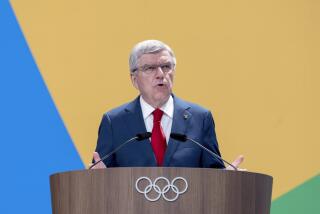IOC Event Set for Copenhagen
- Share via
TURIN, Italy — Despite a recent furor over cartoons depicting the prophet Muhammad, first published in September by a Danish newspaper, the International Olympic Committee on Wednesday picked Copenhagen as the site of a major Olympic conclave in 2009.
The Danish capital defeated six other cities in the vote to stage the “Olympic Congress,” a periodic evaluation of Olympic issues. Copenhagen defeated Cairo, 59-40, in the final round of balloting.
Athens, site of the 2004 Summer Games, was the first city eliminated -- an apparent rebuke by the IOC of the Greek capital’s organizational capacities. Other unsuccessful candidates were Riga, Latvia; Singapore; Taipei, Taiwan; and Pusan, South Korea. The most recent Olympic congress was held in Paris in 1994.
The IOC membership rolls are dominated by Europeans, and as the only major Western European capital in the race, Copenhagen had been widely considered the favorite.
Voting, however, was done after fiery protests and bloody demonstrations in Beirut; Damascus, Syria; and elsewhere over the cartoons. Danish IOC member Kai Holm had implored members before the vote to “separate sports and politics.”
In another development, the U.S. Olympic Committee, in a move that suggests U.S. interest in bidding for the 2016 Summer Games, as well as promoting American interests in the Olympic movement, announced the appointment of Robert Fasulo, 41, as director of international relations.
“He gives us an enormous strength,” USOC Chairman Peter Ueberroth said.
An American who speaks four languages, Fasulo has spent the last 15 years in Europe, first in key roles for the international track and field federation, then as director of a federation that oversees the interests of the 28 Summer Games sports.
The head of that federation, longtime IOC member Denis Oswald of Switzerland, was the IOC’s chief inspector for the 2004 Games in Athens and holds the same position for the London 2012 Games.
Fasulo acknowledged Wednesday that he would face a significant challenge. But in him, he said, others in the so-called Olympic family immediately gain “someone they know to talk to.”
New York’s lackluster fourth-place finish last July in the 2012 derby underscored the USOC’s diminished standing in international relations efforts. Olympic members from other nations are openly lobbying to cut the USOC’s shares of marketing and broadcasting revenue.
Meanwhile, the IOC reported that its financial reserves had grown to $258 million as of Dec. 31, 2005, up from $105 million at the end of 2001.
IOC President Jacques Rogge has sought for the last several years to increase those reserves past $250 million, contending that the sum would keep the IOC in business in case of war or other exigency.
More to Read
Go beyond the scoreboard
Get the latest on L.A.'s teams in the daily Sports Report newsletter.
You may occasionally receive promotional content from the Los Angeles Times.






